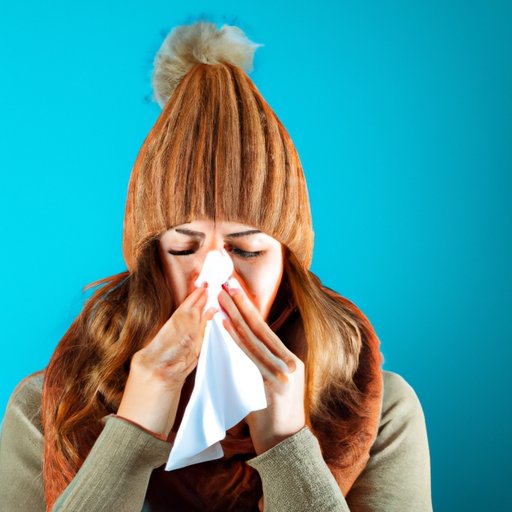
Introduction
As the temperature drops and snow starts to fall, many people start to worry about catching a cold or the flu. There’s a common misconception that being exposed to cold weather can make you sick, but is there any truth to this idea? In this article, we’ll explore the science behind why cold weather doesn’t make you sick and provide some tips for staying healthy during the winter months.
The Science Behind Why Cold Weather Doesn’t Make You Sick
To understand why cold weather doesn’t make you sick, it’s important to know how viruses and bacteria spread. Most respiratory illnesses are caused by viruses or bacteria that are transmitted from person to person through respiratory secretions. This usually happens when a person infected with a virus coughs or sneezes and releases droplets that another person inhales.
While cold temperatures may temporarily lower your body’s defenses, they don’t actually cause illness. In fact, some studies have shown that cold weather may actually stimulate your immune system and make it more effective at fighting off infections.
Bust Common Myths Associated with the Idea that Cold Weather Makes You Sick
There are many misconceptions about the common cold, the flu, and other respiratory illnesses. For example, some people believe that going outside with wet hair can cause you to catch a cold. However, there’s no scientific evidence to support this claim.
Another common myth is that the flu is just a bad cold. While they share some symptoms, the flu is actually a much more serious illness that can lead to complications such as pneumonia.
These misconceptions persist despite scientific evidence to the contrary because they’re often passed down from generation to generation or perpetuated by the media.
Lifestyle Factors That Impact Our Ability to Fight Off Illness
While cold weather itself doesn’t make you sick, there are lifestyle factors that can impact your ability to fight off infections. For example, stress can weaken your immune system and make you more susceptible to illness. Similarly, not getting enough sleep or eating a poor diet can also impact your immunity.
Changes in the weather can also affect these lifestyle factors. For example, shorter days can disrupt your sleep schedule and make it harder to get enough vitamin D, which is important for immune function.
Tips for Staying Healthy During the Winter Months
To stay healthy during the winter months, it’s important to maintain a healthy lifestyle. This includes getting enough sleep, exercising regularly, and eating a balanced diet. Additionally, staying hydrated and getting enough vitamin D can help support your immune system.
Other strategies for staying healthy include washing your hands regularly, avoiding close contact with people who are sick, and disinfecting surfaces that may be contaminated with viruses or bacteria.
The Benefits of Cold Weather for Our Health
While cold weather may not make you sick, it may actually have some health benefits. For example, exposure to cold temperatures has been shown to boost metabolism and improve sleep quality. Additionally, some studies suggest that exposing your body to cold temperatures can stimulate the production of brown fat, which can help with weight loss.
Personal Anecdotes and Expert Perspectives
While the science behind why cold weather doesn’t make you sick is clear, personal anecdotes and expert perspectives can add an emotional dimension to the article. People may share stories of times when they thought cold weather made them sick, even if science suggests otherwise. Additionally, medical experts can provide insights into how lifestyle factors and other environmental factors can impact our health during the winter months.
Conclusion
In conclusion, cold weather itself doesn’t make you sick. While it’s important to take steps to maintain your health during the winter months, such as getting enough sleep and staying hydrated, there’s no need to be afraid of the cold. By separating fact from fiction and understanding how viruses and bacteria spread, you can stay healthy all year long.




